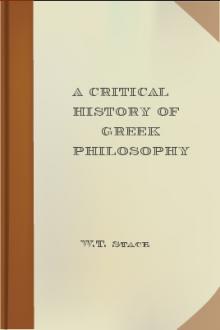Hegel's Philosophy of Mind by Georg Wilhelm Friedrich Hegel (novels to improve english .TXT) 📕

- Author: Georg Wilhelm Friedrich Hegel
- Performer: -
Book online «Hegel's Philosophy of Mind by Georg Wilhelm Friedrich Hegel (novels to improve english .TXT) 📕». Author Georg Wilhelm Friedrich Hegel
As against Spinozism, again, it is to be noted that the mind in the judgment by which it “constitutes” itself an ego (a free subject contrasted with its qualitative affection) has emerged from substance, and that the philosophy, which gives this judgment as the absolute characteristic of mind, has emerged from Spinozism.
§ 416. The aim of conscious mind is to make its appearance identical with its essence, to raise its self-certainty to truth. The existence of mind in the stage of consciousness is finite, because it is merely a nominal self-relation, or mere certainty. The object is only abstractly characterised as its; in other words, in the object it is only as an abstract ego that the mind is reflected into itself: hence its existence there has still a content, which is not as its own.
§ 417. The grades of this elevation of certainty to truth are three in number: first (a) consciousness in general, with an object set against it; (b) self-consciousness, for which ego is the object; (c) unity of consciousness and self-consciousness, where the mind sees itself embodied in the object and sees itself as implicitly and explicitly determinate, as Reason, the notion of mind.
[pg 050]§ 418. Consciousness is, first, immediate consciousness, and its reference to the object accordingly the simple and underived certainty of it. The object similarly, being immediate, an existent, reflected in itself, is further characterised as immediately singular. This is sense-consciousness.
Consciousness—as a case of correlation—comprises only the categories belonging to the abstract ego or formal thinking; and these it treats as features of the object (§ 415). Sense-consciousness therefore is aware of the object as an existent, a something, an existing thing, a singular, and so on. It appears as wealthiest in matter, but as poorest in thought. That wealth of matter is made out of sensations: they are the material of consciousness (§ 414), the substantial and qualitative, what the soul in its anthropological sphere is and finds in itself. This material the ego (the reflection of the soul in itself) separates from itself, and puts it first under the category of being. Spatial and temporal Singularness, here and now (the terms by which in the Phenomenology of the Mind (W. II. p. 73), I described the object of sense-consciousness) strictly belongs to intuition. At present the object is at first to be viewed only in its correlation to consciousness, i.e. a something external to it, and not yet as external on its own part, or as being beside and out of itself.
§ 419. The sensible as somewhat becomes an other: the reflection in itself of this somewhat, the thing, has many properties; and as a single (thing) in its immediacy has several predicates. The muchness of the sense-singular [pg 051] thus becomes a breadth—a variety of relations, reflectional attributes, and universalities. These are logical terms introduced by the thinking principle, i.e. in this case by the Ego, to describe the sensible. But the Ego as itself apparent sees in all this characterisation a change in the object; and self-consciousness, so construing the object, is sense-perception.
§ 420. Consciousness, having passed beyond the sensibility, wants to take the object in its truth, not as merely immediate, but as mediated, reflected in itself, and universal. Such an object is a combination of sense qualities with attributes of wider range by which thought defines concrete relations and connexions. Hence the identity of consciousness with the object passes from the abstract identity of “I am sure” to the definite identity of “I know, and am aware.”
The particular grade of consciousness on which Kantism conceives the mind is perception: which is also the general point of view taken by ordinary consciousness, and more or less by the sciences. The sensuous certitudes of single apperceptions or observations form the starting-point: these are supposed to be elevated to truth, by being regarded in their bearings, reflected upon, and on the lines of definite categories turned at the same time into something necessary and universal, viz. experiences.
§ 421. This conjunction of individual and universal is admixture—the individual remains at the bottom hard and unaffected by the universal, to which however it is related. It is therefore a tissue of contradictions—between the single things of sense apperception, which form the alleged ground of general experience, and the [pg 052] universality which has a higher claim to be the essence and ground—between the individuality of a thing which, taken in its concrete content, constitutes its independence and the various properties which, free from this negative link and from one another, are independent universal matters (§ 123). This contradiction of the finite which runs through all forms of the logical spheres turns out most concrete, when the somewhat is defined as object (§ 194 seqq.).
§ 422. The proximate truth of perception is that it is the object which is an appearance, and that the object's reflection in self is on the contrary a self-subsistent inward and universal. The consciousness of such an object is intellect. This inward, as we called it, of the thing is on one hand the suppression of the multiplicity of the sensible, and, in that manner, an abstract identity: on the other hand, however, it also for that reason contains the multiplicity, but as an interior “simple” difference, which remains self-identical in the vicissitudes of appearance. This simple difference is the realm of the laws of the phenomena—a copy of the phenomenon, but brought to rest and universality.
§ 423. The law, at first stating the mutual dependence of universal, permanent terms, has, in so far as its distinction is the inward one, its necessity on its own part; the one of the terms, as not externally different from the other, lies immediately in the other. But in this manner the interior distinction is, what it is in truth, the distinction on its own part, or the distinction which is none. With this new form-characteristic, on the whole, consciousness implicitly vanishes: for consciousness as such implies the reciprocal independence [pg 053] of subject and object. The ego in its judgment has an object which is not distinct from it,—it has itself. Consciousness has passed into self-consciousness.
§ 424. Self-consciousness is the truth of consciousness: the latter is a consequence of the former, all consciousness of an other object being as a matter of fact also self-consciousness. The object is my idea: I am aware of the object as mine; and thus in it I am aware of me. The formula of self-consciousness is I = I:—abstract freedom, pure “ideality.” In so far it lacks “reality”: for as it is its own object, there is strictly speaking no object, because there is no distinction between it and the object.
§ 425. Abstract self-consciousness is the first negation of consciousness, and for that reason it is burdened with an external object, or, nominally, with the negation of it. Thus it is at the same time the antecedent stage, consciousness: it is the contradiction of itself as self-consciousness and as consciousness. But the latter aspect and the negation in general is in I = I potentially suppressed; and hence as this certitude of self against the object it is the impulse to realise its implicit nature, by giving its abstract self-awareness content and objectivity, and in the other direction to free itself from its sensuousness, to set aside the given objectivity and identify it with itself. The two processes are one and the same, the identification of its consciousness and self-consciousness.
§ 426. Self-consciousness, in its immediacy, is a singular, and a desire (appetite),—the contradiction implied [pg 054] in its abstraction which should yet be objective,—or in its immediacy which has the shape of an external object and should be subjective. The certitude of one's self, which issues from the suppression of mere consciousness, pronounces the object null: and the outlook of self-consciousness towards the object equally qualifies the abstract ideality of such self-consciousness as null.
§ 427. Self-consciousness, therefore, knows itself implicit in the object, which in this outlook is conformable to the appetite. In the negation of the two one-sided moments by the ego's own activity, this identity comes to be for the ego. To this activity the object, which implicitly and for self-consciousness is self-less, can make no resistance: the dialectic, implicit in it, towards self-suppression exists in this case as that activity of the ego. Thus while the given object is rendered subjective, the subjectivity divests itself of its one-sidedness and becomes objective to itself.
§ 428. The product of this process is the fast conjunction of the ego with itself, its satisfaction realised, and itself made actual. On the external side it continues, in this return upon itself, primarily describable as an individual, and maintains itself as such; because its bearing upon the self-less object is purely negative, the latter, therefore, being merely consumed. Thus appetite in its satisfaction is always destructive, and in its content selfish: and as the satisfaction has only happened in the individual (and that is transient) the appetite is again generated in the very act of satisfaction.
§ 429. But on the inner side, or implicitly, the sense of self which the ego gets in the satisfaction does not remain in abstract self-concentration or in mere individuality; on the contrary,—as negation of immediacy and individuality the result involves a character of universality and of the identity of self-consciousness [pg 055] with its object. The judgment or diremption of this self-consciousness is the consciousness of a “free” object, in which ego is aware of itself as an ego, which however is also still outside it.
§ 430. Here there is a self-consciousness for a self-consciousness, at first immediately as one of two things for another. In that other as ego I behold myself, and yet also an immediately existing object, another ego absolutely independent of me and opposed to me. (The suppression of the





Comments (0)